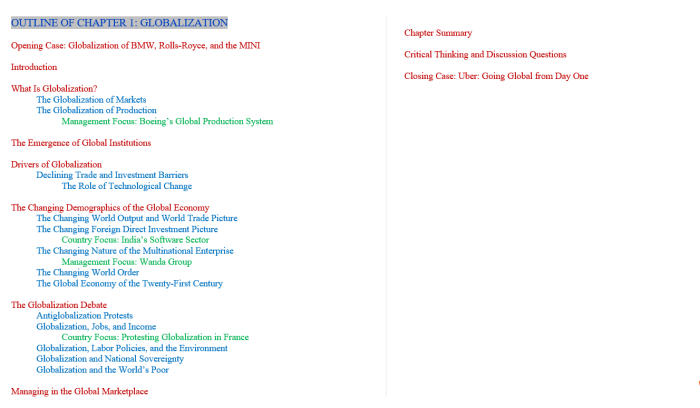International business competing in the global marketplace 13th edition – Embarking on a comprehensive exploration of international business, the 13th edition of “International Business Competing in the Global Marketplace” offers an authoritative and engaging examination of the complexities and opportunities that define this dynamic field. As businesses navigate the ever-evolving global landscape, this esteemed text provides a wealth of insights and strategies to help them succeed in the competitive international arena.
Delving into the intricacies of global market dynamics, the book unravels the impact of cultural, economic, and political factors on international business operations. It highlights the transformative role of technology in shaping the global business environment and explores the diverse strategies employed by companies to enter and compete in international markets.
1. Global Market Dynamics

The global marketplace presents a complex and challenging environment for businesses operating across borders. Cultural, economic, and political factors create a dynamic landscape that requires a deep understanding of the nuances of each market.
Cultural differences impact consumer behavior, business practices, and communication styles. Economic factors, such as currency fluctuations, inflation, and economic development, influence purchasing power and market demand. Political factors, including government regulations, trade policies, and geopolitical tensions, can shape the operating environment for businesses.
Technology plays a transformative role in the global business landscape. Advances in communication, transportation, and digital technologies have facilitated the flow of goods, services, and information across borders, creating new opportunities for businesses to reach global customers.
2. International Business Strategies
To succeed in the global marketplace, businesses need to develop effective international business strategies. These strategies should consider the specific characteristics of each target market and the overall global business environment.
Different strategies for entering and competing in global markets include:
- Exporting: Selling goods or services to foreign markets without establishing a physical presence.
- Licensing: Granting permission to a foreign company to use the company’s patents, trademarks, or other intellectual property.
- Franchising: Establishing a business relationship with a foreign company that operates under the company’s brand and business model.
- Joint ventures: Partnering with a foreign company to create a new business entity.
- Foreign direct investment: Establishing a physical presence in a foreign market by building or acquiring facilities.
Successful international business strategies often involve thorough market research, localization of products and services to meet local needs, and strategic partnerships with local companies.
3. Managing Global Operations

Managing global operations presents unique challenges and opportunities for businesses. Supply chain management, logistics, and cross-cultural communication are critical aspects of successful global operations.
Businesses need to establish efficient supply chains that can handle the complexities of international trade, including customs regulations, currency fluctuations, and transportation challenges. Effective logistics management is essential to ensure timely and cost-effective delivery of goods and services to global customers.
Cross-cultural communication is a vital skill for managers operating in global environments. Understanding cultural differences in communication styles, business practices, and negotiation tactics can help businesses avoid misunderstandings and build strong relationships with international partners.
Legal and ethical considerations are also important in managing global operations. Businesses need to comply with the laws and regulations of each country they operate in and adhere to ethical standards that align with the company’s values and the expectations of global stakeholders.
FAQ Explained: International Business Competing In The Global Marketplace 13th Edition
What are the key challenges of operating in the global marketplace?
Operating in the global marketplace presents numerous challenges, including cultural differences, economic disparities, political instability, and varying legal and regulatory frameworks.
How can businesses effectively enter and compete in global markets?
To succeed in global markets, businesses need to conduct thorough market research, adapt their products and services to local cultures, establish strategic partnerships, and leverage technology to enhance their operations.
What are the best practices for managing global operations?
Best practices for managing global operations include establishing a clear global strategy, optimizing supply chain management, ensuring effective cross-cultural communication, and adhering to legal and ethical standards in all countries of operation.